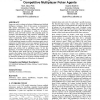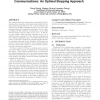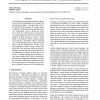53 search results - page 10 / 11 » A Polynomial-time Nash Equilibrium Algorithm for Repeated St... |
ATAL
2010
Springer
13 years 8 months ago
2010
Springer
Games are used to evaluate and advance Multiagent and Artificial Intelligence techniques. Most of these games are deterministic with perfect information (e.g. Chess and Checkers)....
ATAL
2006
Springer
13 years 11 months ago
2006
Springer
In many Multi-Agent Systems (MAS), agents (even if selfinterested) need to cooperate in order to maximize their own utilities. Most of the multi-agent learning algorithms focus on...
ICML
2003
IEEE
14 years 8 months ago
2003
IEEE
A satisfactory multiagent learning algorithm should, at a minimum, learn to play optimally against stationary opponents and converge to a Nash equilibrium in self-play. The algori...
MOBIHOC
2007
ACM
14 years 7 months ago
2007
ACM
We consider distributed opportunistic scheduling (DOS) in wireless ad-hoc networks, where many links contend for the same channel using random access. In such networks, distribute...
ICML
2001
IEEE
14 years 8 months ago
2001
IEEE
As multiagent environments become more prevalent we need to understand how this changes the agent-based paradigm. One aspect that is heavily affected by the presence of multiple a...



